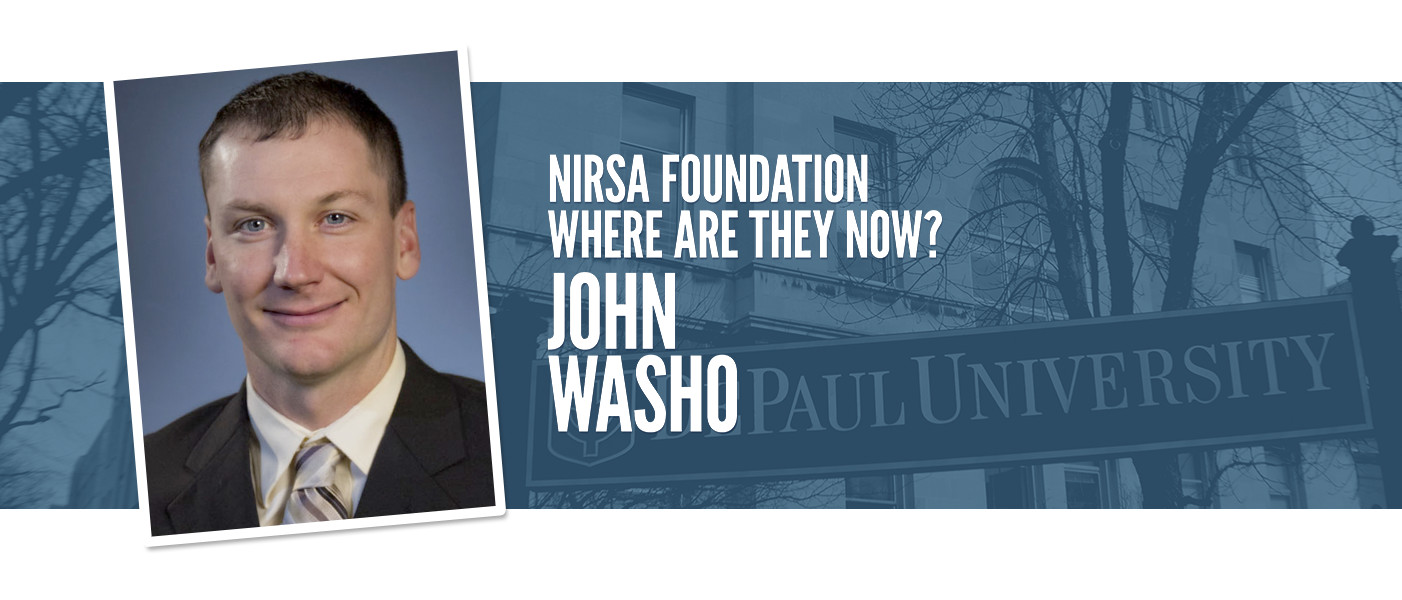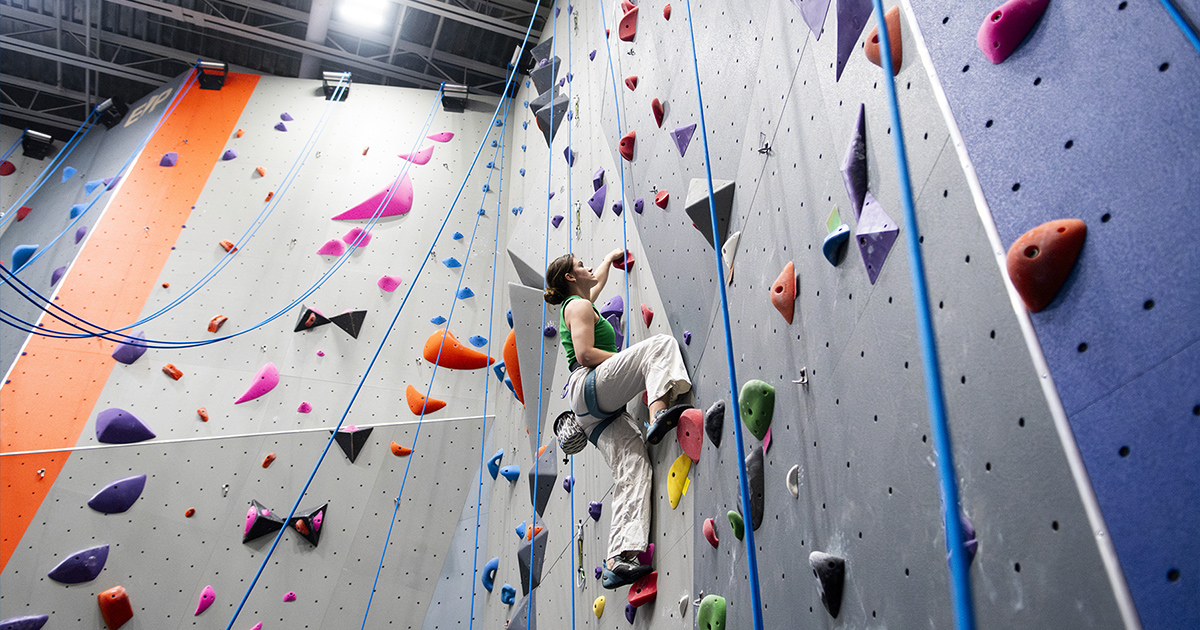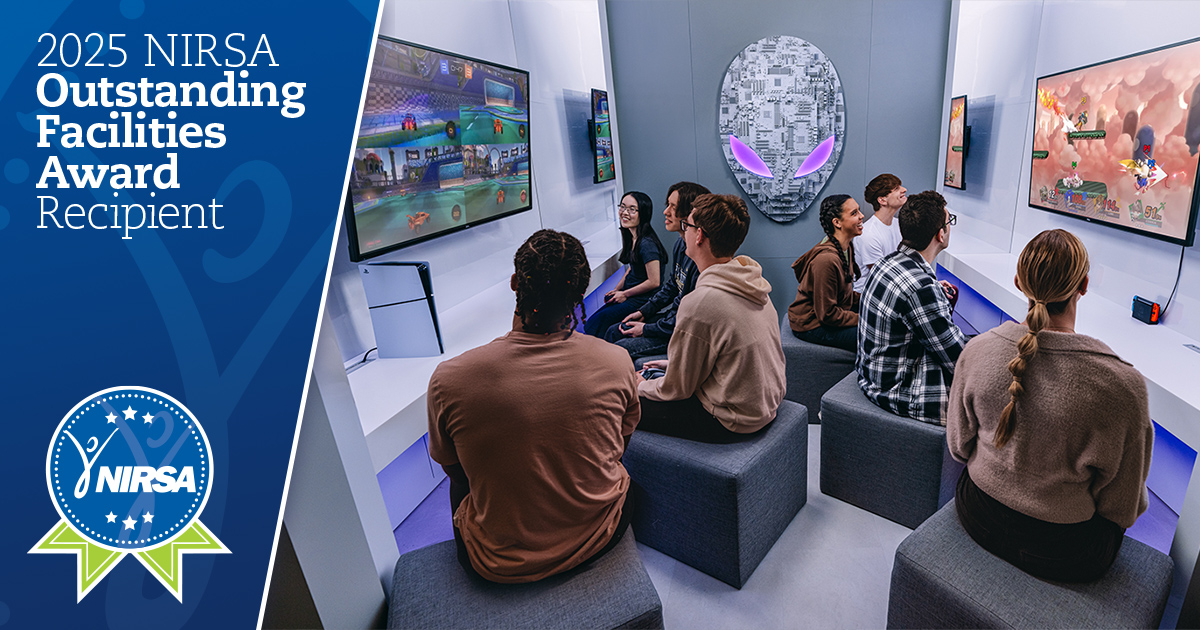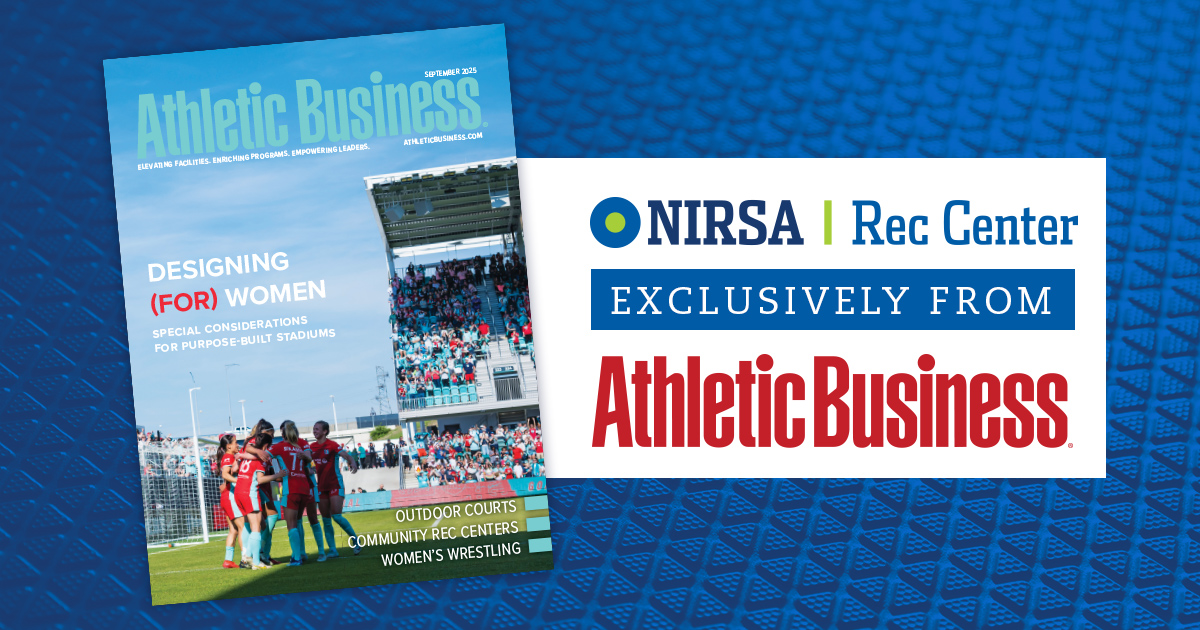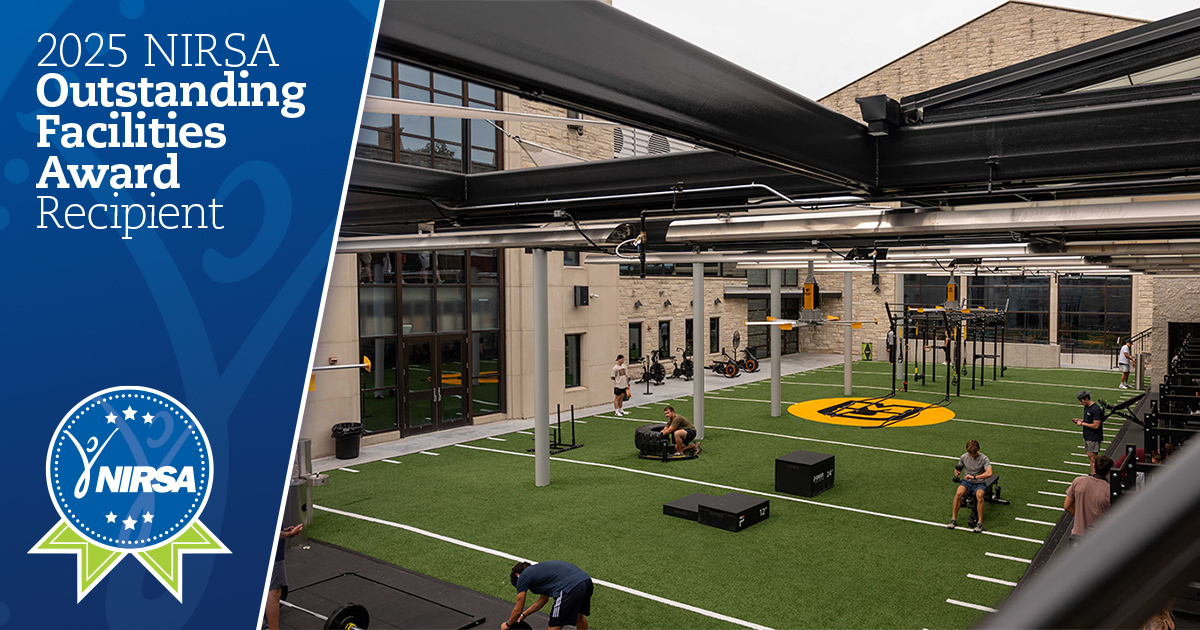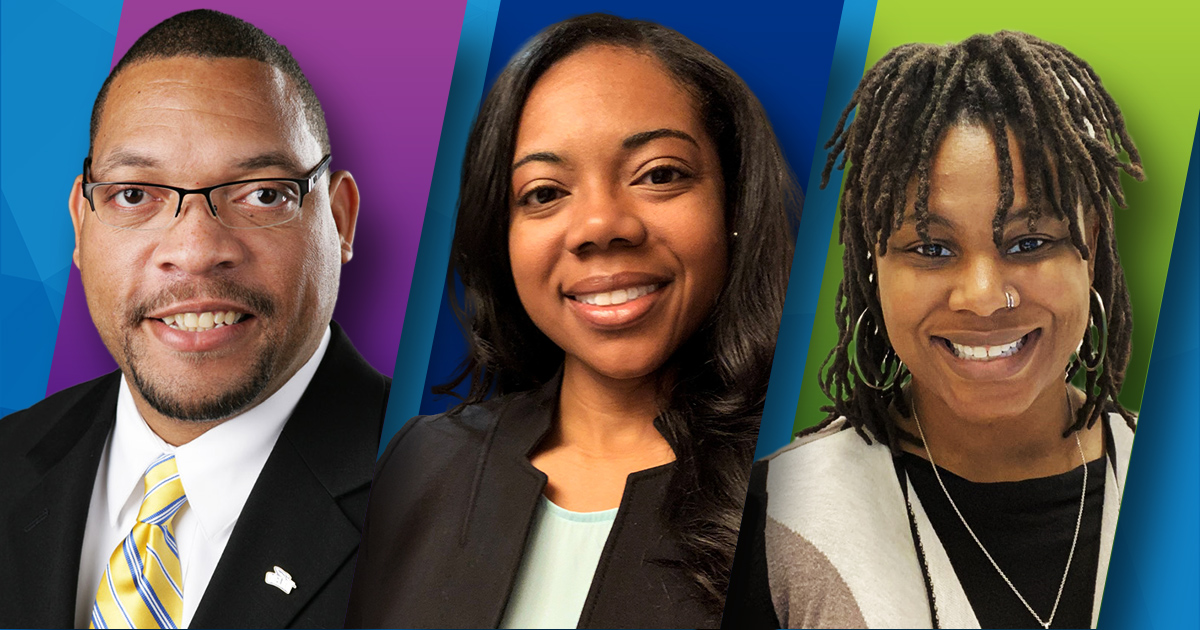John Washo has been working in recreation centers since he was just 12 years old. He started out as a scorekeeper for men’s league games and an official for third grade soccer and basketball games at his community recreation facility. His work in recreation continued throughout high school—he worked just about every position at the facility—and led him to apply to work at the Pepsico Recreation Center as an undergraduate at Augustana College; it “seemed like it made sense for an on-campus job,” he explains. John knew from an early age that he wanted “a profession in the ‘sports field,’” but he didn’t have a clear sense of what that meant—or that joining the collegiate recreation profession was an option—until his junior year when he officiated a NIRSA regional flag football tournament at the University of Nebraska–Lincoln.
This tournament stands out in John’s memory as the event that “changed [his] perspective” on recreation as a profession. It was there that he had the chance to see “firsthand the importance of student development,” and realized that the work campus recreation professionals were doing “happens at institutions all across the country.” Recreation professionals “have the opportunity to work with students at a crucial, formative period in their lives,” says John. “This gives us an amazing and exceptional chance to aid in the growth and development of these students as they determine their path in the professional world.” John credits attending this one tournament at the University of Nebraska–Lincoln with “starting [him] down the campus recreation path.” If he had stuck to officiating only “on campus and in the community during college,” he actually wouldn’t “be in the field today.”
John’s current professional position is as Senior Assistant Director, Programs at Centers, LLC at DePaul University. He spent his undergraduate years at Augustana College, his graduate assistantship at Western Illinois University, and an internship at the University of Nebraska–Lincoln working in intramurals. At DePaul, he says, “the areas I have supervised and worked in have changed, which has allowed me a fantastic opportunity to grow and gain experience in new and different fields.” Over the course of John’s career, he’s retained his love for sports and tournament play, and he has been heavily involved with the NIRSA Championship Series Basketball Committee for several years now.
Over the course of his long involvement with campus recreation, John has received not one, but two scholarships from the NIRSA Foundation. He received his first scholarship in 2003 as a graduate student at Western Illinois University and his second in 2014 as a professional at DePaul University. “I was really surprised when I found out I had a received that first scholarship,” John says. “I knew how competitive they could be and how many other individuals were equally deserving. To know I was selected really meant a lot.” John would not have been able to attend the 2003 NIRSA Annual Conference in Cleveland, Ohio without that initial NIRSA Foundation scholarship. “For me,” John explains, “it was a non-travel year, so attending the conference without the scholarship would have been very difficult.”
John’s first NIRSA Annual Conference experience happened in 2000 while he was an undergraduate at Augustana College. Going into that Annual Conference, John was already invested in student development through recreation. What attending the Annual Conference really accomplished was acquainting John with NIRSA as an association. The experience illustrated to him the camaraderie and genuine desire to support one another that is a hallmark of NIRSA and its membership. It is something John can’t emphasize enough—the Association’s uncommon desire to lift up students and professionals: “This is what stands out and still resonates today. We are a very unique association in how welcoming and helpful we are to one another. No matter who you are or where you work, whether you know people or not, the members of NIRSA will reach out and be there for you.”
From scholarships to mentorship, NIRSA and its membership are wholeheartedly invested in supporting students and young professionals. Don Umland, Director of Campus Recreation at Augustana College, is one of many mentors who have supported John throughout his career. He gave John “the opportunity to not just officiate and supervise intramurals, but also to take on the role of Student Assistant Director of Intramurals/Recreation.” John says that, “In that capacity, I was essentially gaining graduate assistant level experience as an undergraduate. Don was very intentional in fostering development opportunities and taught me a lot about the concept of student development in the process.” Today, John still relies on the guidance of mentors who “continue to push and help me to grow as a professional.” He now tries to “apply the same model of development” to his work with students and other professionals. He wants to help them along their path just as his mentors have helped him.
The importance of giving back was made clear to John during his first NIRSA Annual Conference experience. The four days, which were “a whirlwind of activity,” could have easily been overwhelming since Don was unable to attend. John was at the conference knowing only the one other student there from Augustana College. However, “that initial shock and feeling of being overwhelmed,” says John, “was quickly countered by so many individuals—colleagues of Don’s as well as other professionals—who went out of their way to help make us feel comfortable.” This is why John believes in the importance of the cycle of giving, in the importance of giving back to an Association that is so focused on its members’ needs.
“NIRSA has meant a lot to me,” says John. “The opportunities provided by the Association have helped put me where I am today. I stay involved to keep that going. To give back and continue to provide future leaders with some of the same experiences and opportunities I had.” John is also deeply invested in what he calls the “evolution of NIRSA,” and so his advice for future generations of recreation professionals is to continue giving back to the Association. He believes that “we need to continue looking at new and different way to do things to maintain NIRSA’s success and provide opportunities for future generations. By staying involved, I want to try and be a small part of that.” As a recipient of NIRSA Foundation Scholarships, of years of dedicated mentorship, of the kindness of NIRSA professionals he’d never even met before, John knows firsthand the importance of helping NISRA: Leaders in Collegiate Recreation grow.
John’s experiences, as well as those of hundreds of other students and volunteers, are made possible by generous donors to the NIRSA Foundation. Learn more about how they are working to strengthen the future of collegiate recreation and how you can support their efforts.
If you’re interested in sharing your story, please contact NIRSA Foundation Board Member Chris Muller, or NIRSA Foundation Coordinator Kelley Hungerford.
Nazifa Islam was previously the Communications Coordinator at NIRSA.


